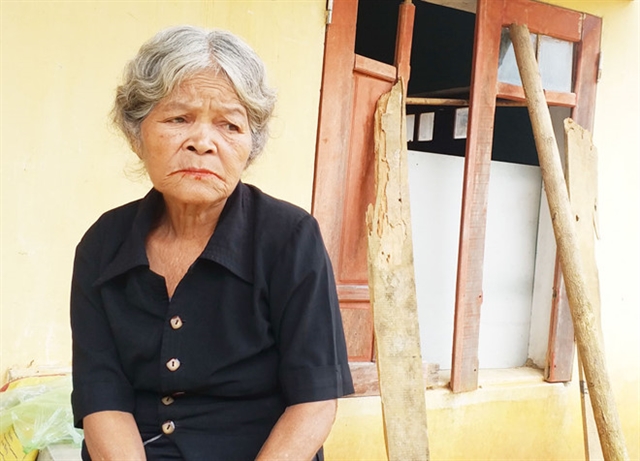 Society
Society

Six years ago, a village of tycoons appeared in Sơn Tây District, in the central province of Quảng Ngãi, as local people became billionaires overnight thanks to land compensation from a hydropower project.

|
| Villager Đinh Thị Vưn of the Anh Nhoi 2 resettlement village, Sơn Tây District, Quảng Ngãi Province. Photo thanhnien.vn |
QUẢNG NGÃI — Six years ago, a village of tycoons appeared in Sơn Tây District, in the central province of Quảng Ngãi, as local people became billionaires overnight thanks to land compensation from a hydropower project.
Almost immediately, they poured money into building splendid homes that shaped a new urban area in the forest.
Most of them, however, soon returned to poverty and now have to live on rice subsidies due to overspending.
Only elderly people and children are left in the palatial houses in the Anh Nhoi 2 resettlement area in Sơn Long Commune, as young people of working age don’t stay, seeking out better opportunities in neighbouring cities and provinces or returning to their old villages where they used to live.
Village of billionaires
Đỗ Thanh Vượt, Chairman of the People’s Committee of Sơn Long commune, told Thanh Niên (Young People) newspaper that 33 households in Anh Nhoi 2 village under a resettlement housing got a huge amount of money in land compensation from Đăk Đrinh hydropower project, with pay-outs ranging from hundreds of million to billions of đồng.
Vượt said that most of the nouveau riche in the village had returned to poverty because they overspent on luxuries, including cars, motorbikes, palatial mansions, and boozy parties.
The house of local man Đinh Văn Điều now sits empty, with rusty locks on the doors. Điều reportedly sold his house and returned to his former village nearby.
Đinh Văn Bây, vice police chief in Sơn Long Commune, said Điều received VNĐ3 billion (US$130,400) in land compensation. But his 20-year-old son, Đinh Văn Thiên, frittered away his fortune. Thiên asked his father to buy him a VNĐ400 million car and a VNĐ1.9 billion house. The more money his son wasted, the faster Điều fell into poverty.
Đinh Văn Rê and his wife Đinh Thị Vưn in Anh Nhoi Village 2 suffered the same fate. They received VNĐ3 billion in land compensation, but their son Đinh Văn Xanh spent their money, the police officer said.
“Vưn’s family is now regarded as a poor household. There is nothing valuable in her house,” Vượt said.
“The owners of the abandoned houses haven’t returned to the village for many months. The owners of homes with children sent their kids to somebody else, so they could move to other cities and provinces to earn a livelihood," Bây said.
'No farmland, no rice'
An elderly woman named Đinh Thị Vưn, a member of the Cadong ethnic minority, was sitting in front of her house, chewing betel leaves. Vưn said she missed her old village.
In 2013, Vưn’s family agreed to give up four hectares of farmland in Ra Manh village to Đăk Đrinh hydro power project in return for a house in a resettlement area and 600 sq.m of land for cultivation.
Vưn realised that easy come, easy go.
“I bought land in Tà Mục Village in Sơn Dung Commune as well as planting cassava in H.Kon Plông in the Central Highlands province of Kon Tum. However, the money we earn from cassava is not enough to buy rice. My healthy family members have left for other provinces to earn money, but elderly people like me do not have the strength to move,” Vưn said.
“No farmland, so no rice here. We have nothing to do on a daily basis so we often drink alcohol to drown our sorrows, which is not good for our health. The young people in the village only return home during Tết holiday. I am afraid that if someone passes away, nobody will be here to carry his coffin,” she said.
More people in the resettlement area have moved to their old villages, because there is no source of income.
Đinh Văn Công used his pay-out of VNĐ800 million to purchase forest land and cattle. He now owns 20 hectares of land, 40 cows and 50 goats, but he no longer wants to stay in the resettlement area even though it has good roads, schools, and healthcare facilities. Công decided to go back to his hometown in Ra Manh Village.
“It is 16 kilometres to move from my new house in the resettlement area to my work place. It is even harder to commute along the forest roads in the rainy season”, Công said.
Đỗ Thanh Vượt said that eight out of 33 households in the resettlement area in Anh Nhoi 2 have returned to their old villages because they don’t have any means of living here. The rest have moved to urban areas in search of jobs, leaving elderly people and kids alone in the forest. — VNS




